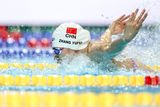Performance director of Swim Ireland calls for ‘thorough and independent’ investigation into Chinese doping controversy
Swim Ireland performance director Jon Rudd
The performance director of Swim Ireland, Jon Rudd, has called for a thorough and independent investigation into the growing controversy over how 23 Chinese swimmers escaped censure even though they tested positive for a banned substance seven months before the Tokyo Olympics.
Dr Rudd, who is also president of the World Swimming Coaches Association, said the affair had “certainly hurt our sport at such a close point to the Paris Olympics”.
“It’s ever so difficult to decide where responsibility and blame lies. There’s questions around WADA’s handling of this and how they potentially have taken the word of the Chinese anti-doping agency as read.
“It’s unclear as to where World Aquatics sit in terms of their responsibility but what it has done is certainly hurt our sport at such a close point to the Olympic Games.
“It’s quite sad because China have not been the first nation on everybody’s minds most recently when it comes to doping issues and they have some startling athletes, some superb athletes, that you would desperately hope are clean because they are helping to evolve the sport and provide a spectacle and excitement at world level.
“So, I sincerely hope that this is investigated thoroughly and independently and that we get an outcome that satisfies athletes, coaches and their entourages around the world because at the moment it does seem to be an unsatisfactory situation,” said Rudd.
Asked about the impact the controversy will have on swimmers, Dr Rudd said: “It will leave an unpleasant taste in the mouth of most swimmers around the world.”
Today's Sport News in 90 Seconds - 1st May
Twenty-three top Chinese swimmers tested positive for the same powerful banned substance – trimetazidine (TMZ) – seven months before the Tokyo Olympics in 2021.
However, all were allowed to continue to compete after top Chinese officials secretly cleared them of doping offences and the World Anti-Doping Agency (WADA) chose not to intervene.
Several of the athletes who tested positive — including nearly half of the swimming team that China sent to the Tokyo Games — went on to win medals, including three golds.
Many still compete for China and several, including the two-time gold medallist Zhang Yufei, are expected to contend for medals again at this year’s Games in Paris.
China acknowledged the positive tests in a report by its anti-doping regulator, saying the swimmers had ingested the banned substance unwittingly and in tiny amounts, and that no action against them was warranted, according to a report in the New York Times.
Following widespread criticism led by the United States, WADA has agreed to an independent review of their handling of the case led by Swiss prosecutor Eric Cottier, who is expected to deliver his report within two months.
However, the US Anti-Doping Agency (USADA) criticised WADA’s appointment of Cottier, describing it as a “circle the wagons exercise to protect the system”.
Asked at an Olympic Federation of Ireland press briefing whether Irish swimmers were concerned about the impact on them if rivals had an unfair advantage in the pool, Rudd, who has been performance director for Swim Ireland since 2017, said: “Potentially, but I would say that the vast majority of swimmers I know, and certainly those who are on our own team here in Ireland, have got a job to do regardless of what everybody else is doing.
“It’s kind of a cliche in swimming but it works across other sports and you can only affect what goes on in your own lane and that’s what you should concentrate on.
“It will leave an unpleasant taste in the mouth of most swimmers around the world but I would be doubtful that it is affecting anyone’s preparations or thought processes going into these Games.”















